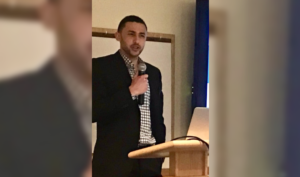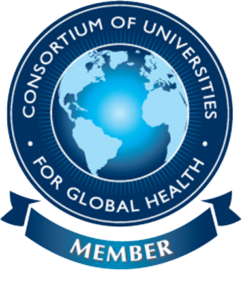By: Mira Garin and Aaron Briggs
“The most difficult social problem in the matter of [African American] health is the peculiar attitude of the nation toward the well-being of the race. There have … been few other cases in the history of civilized peoples where human suffering has been viewed with such peculiar indifference.”
The Philedelphia Negro: A Social Study, 1996
Black History Month is observed every February at SDSU and institutions across the United States to promote recognition of the unique contributions and challenges that comprise the African American story. Although this celebration is limited to a single month, we should remain cognizant that Black history is American history. The African American story is so inextricably interwoven with United States history that neither narrative can be coherently told without the other. Just so, the present-day context, particularly in terms of public health, can only be effectively understood in light of our past. Persistent social inequality and health disparity function as two of many ever-present legacies of slavery and oppression that African Americans continue to experience on a daily basis. A testament to the strength and grace of Black culture, African Americans have overcome crippling historical challenges to contribute beautifully to the shaping of American art, music, theater, cuisine, medicine and more. As the deeds of many Black heroes and champions too often go unsung, we ask you to join us in taking time this month to honor the challenges and contributions of this community which has deeply shaped the country we live in today.
“Of all the forms of inequality, injustice in healthcare
is the most shocking and inhumane.”
Chicago press conference, 1966
“Inequity in health and disease is as American as apple pie,” says Dr. Aaron Briggs, “But that can change.” Dr. Briggs,a Master of Public Health student concentrating in epidemiology at SDSU through the UCSD-SDSU General Preventive Medicine Residency program, has been concerned with health disparity in the United States since medical school. “I have family who live in poverty, and seeing their struggle sparked and fueled my passion for health equity.” He identifies as African American, a group Underrepresented in Medicine (URIM). The URIM classification was designated by the American Academy of Medical Colleges in 2003 in an effort to change the historic trends of racial/ethnic underrepresentation that have long characterized American medicine.
“When we are talking about ethno-racial health disparity and underrepresentation, it is typically the same populations being affected, and this is not a coincidence,” Dr. Briggs explained. The Institute of Medicine (now the National Academy of Sciences) published its Unequal Treatment report in 2003, noting, “the quality [of] care for racial and ethnic minorities can be improved substantially by increasing the proportion of underrepresented US racial and ethnic minorities among health professionals.” Two decades later, the AAMC reported the 2023 American physician workforce to be 6.3% Hispanic/Latinx, 5.2% Black/AfricanAmerican (AA), and 0.3% American Indian/ Alaskan Native (AIAN). “The latter two groups, AA and AIAN, have historically endured the highest rates of all-cause and excess mortality in the United States, and this continues to be the case,” Dr. Briggs emphasized. “If we truly want to address health disparity in America, these key stakeholders need to be included at the table. Barring that, we should not be surprised that things are not changing.”
Many barriers impair URIM entry and retention within medicine. “Although I had wanted to be a doctor since high school, the socio-economic chances were that I would not get the opportunity,” he reflected. “I would not be where I am without the investment of teachers and pipeline programs.” Dr. Briggs recounted that he didn’t take his dream to be a doctor seriously until one mentor he met during a high school pipeline program encouraged him to do so. Two additional URIM programs offered by the University of California San Diego (UCSD) and the Howard Hughes Medical Institute (HHMI) that Dr. Briggs participated in while pursuing his undergraduate degree in biology at Dartmouth College cleared the way for his path into medicine. “I consider myself greatly blessed and privileged to have had these opportunities,” Dr. Briggs acknowledged. “However, many like me – who worked just as hard or harder than I did – were not as fortunate. For this reason, I believe my educational privileges come with a responsibility to fight for the change that I and many others know is needed, but that not everyone has equal opportunity to advocate for.”
 Eventually, he had the chance to work to change this status quo. During his second year of residency with the Children’s Hospital of Philadelphia (CHOP), Dr. Briggs was invited to help lead the American Academy of Pediatrics (AAP) Section on Pediatric Trainees (SOPT) 2021-2022 National Advocacy Campaign: Rx Against Racism. The purpose of the campaign was to frame and address racism in American medicine as a public health crisis. Dr. Briggs designed and proposed a URIM investment program to be included as a novel action arm of the Rx Against Racism Campaign called the Child Health Anti-Racism and Equity Grant (CHANGE). “CHANGE was designed to pay it forward and expand access to the empowering and dignifying programs that were invaluable in my journey to medicine,” he explained. “It’s not only hard for URIM to gain access to participate in the medical community, but it can be a challenging environment to operate in for many reasons ranging from interpersonal racism to appropriation of URIM projects and ideas. I attempted to combine successful and personally meaningful aspects of pipeline programs I had participated in to create an experience that would uplift, empower, and equip URIM leaders to change the world around them. In designing the program, I attempted to emulate the focus on people, not projects that I saw at HHMI. Specifically, the CHANGE Grant’s mission was to fund and prioritize URIM-led research, intervention, and education initiatives within American communities and institutions addressing health disparity/health equity and factors that exacerbate disparities such as lack of diversity in medicine and climate change/ environmental injustice.”
Eventually, he had the chance to work to change this status quo. During his second year of residency with the Children’s Hospital of Philadelphia (CHOP), Dr. Briggs was invited to help lead the American Academy of Pediatrics (AAP) Section on Pediatric Trainees (SOPT) 2021-2022 National Advocacy Campaign: Rx Against Racism. The purpose of the campaign was to frame and address racism in American medicine as a public health crisis. Dr. Briggs designed and proposed a URIM investment program to be included as a novel action arm of the Rx Against Racism Campaign called the Child Health Anti-Racism and Equity Grant (CHANGE). “CHANGE was designed to pay it forward and expand access to the empowering and dignifying programs that were invaluable in my journey to medicine,” he explained. “It’s not only hard for URIM to gain access to participate in the medical community, but it can be a challenging environment to operate in for many reasons ranging from interpersonal racism to appropriation of URIM projects and ideas. I attempted to combine successful and personally meaningful aspects of pipeline programs I had participated in to create an experience that would uplift, empower, and equip URIM leaders to change the world around them. In designing the program, I attempted to emulate the focus on people, not projects that I saw at HHMI. Specifically, the CHANGE Grant’s mission was to fund and prioritize URIM-led research, intervention, and education initiatives within American communities and institutions addressing health disparity/health equity and factors that exacerbate disparities such as lack of diversity in medicine and climate change/ environmental injustice.”
The CHANGE grant was funded by the AAP and conducted its pilot run from November 2021 to 2022, during which CHANGE received proposals from medical students, residents, and fellows with the principle eligibility requirement being AAP membership. “Membership requirement can oftentimes represent another barrier for URIM, but it was deemed necessary in the setting of CHANGE being an AAP sponsored pilot program,” Dr. Briggs acknowledged. In total, eleven URIM-led initiatives and one ally-led program were supported at institutions across the United States. These projects employed a wide variety of approaches, including direct community intervention through mobile clinics, pipeline programs to diversify the next generation of pediatricians, and cutting-edge research advancing our understanding of health disparity in the United States. “As much about empowering and dignifying URIM leaders as it was about supporting their interventions, CHANGE was successful not because of any revolutionary design, but because of the incredibly talented people it supported,” Dr. Briggs emphasized. Following the conclusion of the CHANGE pilot program in November 2022, the initiative was retained by the AAP and renamed the SOPT Health Equity Grant Program, which has continued Dr. Briggs’ work for the past two years. “I would not have had the opportunity to advocate for the health and representation of my community without the investment of URIM support programs throughout my academic career,” he stressed. “If we are serious about tackling American health disparity, we need to elevate the leaders, voices, and ideas from the communities that are impacted most. We need URIM at the table in a meaningful way.”
“While it’s essential to recognize and honor Black contributions, it’s difficult for me to celebrate in light of the crippling challenges that remain for African Americans in this country. My family’s community and communities like it continue to struggle just to survive and make it day-to-day,” Dr. Briggs reflected. “The good news is that fundamental steps to realizing equity in America have been mapped out. The scale of the issue is daunting, but everyone can be a part of the solution, which begins with a refusal to accept our inequitable status quo and a commitment to the empowerment and inclusion of African Americans and our communities.”





